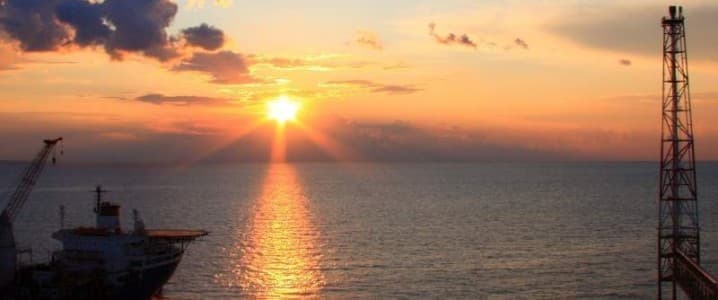Latest Commodity News
Record High Freight Rates for Crude Oil Tankers Amid Middle East Conflict
oilprice.com
2026-03-03 07:19:13 UTCThe freight rates for supertankers transporting crude oil on the crucial Middle East-to-China route have reached unprecedented levels, exceeding $420,000 per day. This surge is attributed to the ongoing conflict in the Middle East, which has significantly disrupted shipping activities in the Strait of Hormuz, a vital passage for global oil and gas shipments.
On Monday, the daily hiring rate for a very large crude carrier (VLCC) peaked at $423,736, marking a historic high according to the Baltic Exchange's TD3C MEG-China index. The situation has led to increased tanker rates across all trade routes, as many vessels are being diverted or left idle near the Strait due to safety concerns.
Iran has claimed to have closed the Strait of Hormuz, threatening to attack any ships attempting to cross. However, U.S. military officials have denied this claim, stating that there is no evidence of mines in the waterway and that Iran's actions do not indicate an actual enforcement of the closure. The conflict has also led to a spike in global supertanker rates, with average rates reaching $280,941 per day, the highest since 2008. Additionally, LNG shipping rates have surged as Qatar, a major LNG exporter, halted production, further destabilizing global gas markets.
U.S. Plans to Address Rising Oil Prices Amid Iran Conflict
oilprice.com
2026-03-03 06:37:19 UTCThe United States is preparing to implement a phased plan to address the recent surge in oil prices, which have risen significantly due to escalating tensions in Iran and the broader Middle East. U.S. Secretary of State Marco Rubio announced that oil prices jumped by 10% following military actions involving the U.S. and Israel against Iran. The situation has led to severe restrictions on oil flows through the crucial Strait of Hormuz, prompting oil companies and insurers to halt operations in the region.
As the conflict escalated, major maritime insurers have ceased providing war risk coverage for vessels operating in the Persian Gulf and the Strait of Hormuz. This decision reflects the heightened risks associated with the ongoing conflict, which the U.S. government anticipated would lead to increased oil prices. Secretary Rubio indicated that the U.S. had a plan ready to mitigate these impacts, with Energy Secretary Chris Wright and Treasury Secretary Scott Bessent set to implement the measures.
The immediate effects of the oil price surge are being felt at gas stations across the U.S., where the national average price of gasoline has surpassed $3 per gallon for the first time since November. This increase is attributed to both the conflict in Iran and the transition to more expensive summer-grade gasoline. As of late Monday, the average gasoline price stood at $3.052 per gallon, marking an increase of 11.1 cents per gallon compared to the previous year. Diesel prices have also risen sharply, reaching their highest levels since July 2024.

Qatar's LNG Production Halt Triggers Global Energy Market Shock
oilprice.com
2026-03-03 01:00:00 UTCA significant disruption in global energy markets occurred when QatarEnergy announced a complete halt to liquefied natural gas (LNG) production due to Iranian drone strikes on key facilities. This shutdown affects approximately 20% of the world's LNG export capacity, marking a rare supply disruption that could have extensive consequences. The situation is exacerbated by geopolitical tensions, which have led to a loss of a foundational pillar in the LNG trade, impacting not just market sentiment but also the fundamentals of supply and demand.
The immediate market reaction was severe, with European wholesale gas prices surging over 50%, the largest single-day increase since the volatility seen during the war in 2022. Oil prices also spiked, reflecting concerns over a broader energy supply crunch. The vulnerability of Europe is particularly pronounced, as gas inventories were already low, and competition for available cargoes is expected to drive prices even higher, affecting electricity costs and inflation metrics in energy-importing economies.
The regional impact of the conflict extends beyond Qatar, with Israel shutting down its Leviathan gas field and Saudi Arabia halting operations at the Ras Tanura refinery. This situation is compounded by the instability in the Strait of Hormuz, a critical shipping route for oil and LNG exports. The ongoing geopolitical tensions raise questions about the duration of the LNG production halt and the potential for long-term structural changes in global gas markets.
As the situation unfolds, the implications for LNG pricing and supply strategies are significant. Governments reliant on imported LNG may need to reassess their energy strategies, considering political hedges and alternative supply alliances. The current crisis could embed a geopolitical risk premium into LNG pricing, reshaping market dynamics for years to come.

First Phosphate Secures Funding for Battery Material Project
mining.com
2026-03-03 00:29:26 UTCFirst Phosphate has received conditional approval for a significant financial contribution from the Government of Canada, amounting to C$16.7 million ($12.2 million). This funding, provided through Natural Resources Canada, is part of the Global Partnerships Initiative and will be used to assess the technical and engineering aspects necessary for producing a phosphate concentrate suitable for the lithium iron phosphate (LFP) battery market.
The contribution will support a study of the company's integrated phosphate concentrate project located in Saguenay-Lac-Saint-Jean, covering eligible activities planned until 2028. This initiative aims to foster industrial collaboration and integrate Canadian projects into international supply chains for battery materials, enhancing Canada's role in the global market.
First Phosphate plans to construct a 10,000-tonne-per-year iron phosphate plant near the Saguenay deep-sea port in 2024. This facility will be part of a vertically integrated operation that transforms phosphate from its mines into cathode active material. The project is expected to bolster Canada's strategic position in the LFP battery value chain by developing domestic capabilities for processing phosphate concentrate into high-purity phosphoric acid.

Impact of Middle East Conflict on Euro Zone Inflation and Growth
A prolonged conflict in the Middle East is expected to significantly impact the euro zone's economy, particularly through inflation and growth rates. Philip Lane, the Chief Economist of the European Central Bank (ECB), indicated that rising energy prices due to the ongoing war could lead to increased inflation in the euro zone. The conflict, which has escalated with attacks involving Israel and Iran, has already caused oil prices to surge by over 10%.
Lane explained that a spike in energy prices would exert upward pressure on inflation, especially in the short term, while simultaneously hindering economic activity. The ECB has conducted analyses suggesting that if the conflict persists and energy supplies are disrupted, it could lead to a significant rise in energy-driven inflation and a notable decline in economic output.
According to previous ECB assessments, a sustained increase in oil prices could raise inflation by 0.5 percentage points and reduce economic growth by 0.1 percentage points. Currently, euro zone inflation is at 1.7%, which is below the ECB's target of 2%. This suggests that even a small increase in inflation is unlikely to prompt immediate policy changes, as the ECB tends to overlook short-term price fluctuations unless they affect long-term inflation expectations.

PacifiCorp Faces $305 Million Verdict Over Wildfire Liability
A significant legal ruling has emerged from Oregon, where a jury awarded $305 million to 16 plaintiffs who held PacifiCorp responsible for not shutting off power lines during a windstorm that led to devastating wildfires. This verdict translates to approximately $19 million per plaintiff, a stark increase from previous awards that averaged around $5 million. The ongoing legal battles, part of the James class action, are expected to continue through early 2028, with PacifiCorp's parent company, Berkshire Hathaway Energy, estimating potential payouts could reach $48 billion, in addition to the $1 billion already awarded.
In light of the recent verdict, S&P has raised concerns about PacifiCorp's financial stability, suggesting that the utility could lose its investment-grade status. This loss could hinder PacifiCorp's ability to secure funding necessary for its operations, including paying suppliers and maintaining power supply to customers. Despite these challenges, PacifiCorp has expressed confidence in its liquidity to manage operations and obligations for at least the next year.
PacifiCorp plans to appeal the jury's decision and is currently awaiting a ruling from the Oregon Court of Appeals regarding the certification of the class action and the potential for claimants to seek damages for emotional distress. Berkshire Hathaway Energy has stated that while it acknowledges responsibility for wildfire incidents, it will contest claims it deems unjustified, emphasizing that PacifiCorp should not be viewed as a last-resort insurer.

Chinese Steel Exports Hit by Middle East Shipping Disruptions
Chinese steel exporters are facing significant challenges due to escalating conflicts in the Middle East, particularly with Iran, which have disrupted shipping routes through the Straits of Hormuz. This strait is crucial not only for oil trade but also for transporting steel to the Gulf region, which has become a vital market for Chinese steel, accounting for 16% of exports last year. As a result of the conflict, some exporters have halted new offers to customers in the Middle East.
The shipping disruptions have led to a shortage of available vessels for loading steel cargoes, forcing steelmakers to stop making offers. Traders have reported that shipping companies are currently not assigning vessels to markets near the Persian Gulf, creating uncertainty in freight guidance and making it difficult for exporters to operate effectively.
This shift in focus towards the Middle East has previously contributed to the resilience of Chinese steel exports over the past three years, despite increasing protectionism in traditional markets like Vietnam and South Korea. However, analysts predict that the current situation will likely lead to a significant decline in steel exports to the Middle East, which could exacerbate domestic supply pressures and result in lower steel prices in China.

Impact of U.S. and Israel Strikes on Energy Sector
The recent military strikes by the U.S. and Israel on Iran have significantly impacted the energy sector, particularly following the death of Iran's supreme leader, Ayatollah Ali Khamenei. This conflict has led to the shutdown of several oil and gas fields in the region and has disrupted shipping through the Strait of Hormuz, a crucial passage for tankers transporting crude oil and liquefied natural gas from Middle Eastern producers to global markets.
Analysts have noted that major oil companies like TotalEnergies, Exxon, and Shell have substantial production interests in the Middle East, with estimates indicating that 29% of TotalEnergies' production, 20% of Exxon's, and 20% of Shell's output comes from this region. Despite the potential threats to production, the ongoing conflict has resulted in a surge in oil and gas prices, which could bolster the profits of these companies.
Exxon's liquefied natural gas (LNG) business is particularly vulnerable, as nearly 60% of its LNG operations are based in the Middle East. Following Iranian drone attacks, QatarEnergy, a key partner for Exxon, Shell, and TotalEnergies, has halted LNG production, affecting about 20% of the global LNG supply. However, Exxon is expected to benefit from the upcoming startup of its Golden Pass LNG project in Texas, which is set to begin production soon.

Saudi Arabia's Non-Oil Sector Growth Slows Amid Competitive Pressures
In February, Saudi Arabia's non-oil private sector experienced a slight slowdown, with the Purchasing Managers' Index (PMI) dropping to 56.1 from January's 56.3. Despite this decline, the PMI remains above the critical threshold of 50.0, indicating continued growth. The slowdown is attributed to competitive pressures, although strong domestic demand and a steady flow of new project approvals have supported the sector's expansion.
The chief economist at Riyad Bank, Naif Al-Ghaith, noted that robust domestic demand is a driving force behind the sector's performance. The survey indicated that the new orders sub-index held steady at 61.8, reflecting strong demand and output growth, alongside a notable increase in employment rates. This growth in employment reached a four-month high, driven by rising sales and backlogs.
However, the survey also revealed that staff cost inflation has surged to its highest level since the survey's inception in August 2009. In light of these developments, JPMorgan has adjusted its non-oil growth forecasts for the Gulf region and Saudi Arabia, reflecting caution due to uncertainties in the economic landscape.

Kuehne + Nagel Reports Decline in Earnings Amid Middle East Conflict
Kuehne + Nagel, a Swiss logistics group, has reported a significant 17% decline in its recurring operating profit for 2025, forecasting flat or lower earnings for the current year. The company anticipates its earnings before interest and taxes to be between 1.2 billion and 1.4 billion Swiss francs in 2026, which is similar to last year's figures. This downturn is attributed to the escalating conflict in the Middle East, which has raised concerns about operational challenges.
The logistics firm, which operates in over 100 countries, has warned its customers to expect cargo delays and potential equipment shortages. This is due to the need to reroute shipments around the Strait of Bab el-Mandeb and the closed Strait of Hormuz, which are critical shipping lanes in the region. Kuehne + Nagel is actively monitoring the situation and assessing its operational implications.
Despite the challenges, the company has implemented a cost savings program aimed at reducing expenses by over 200 million francs. The recurring operating earnings for 2025 were reported at 1.38 billion francs, excluding the costs associated with this savings initiative. The company's shares are expected to decline by 2% in pre-market trading, reflecting investor concerns about the ongoing geopolitical tensions.
